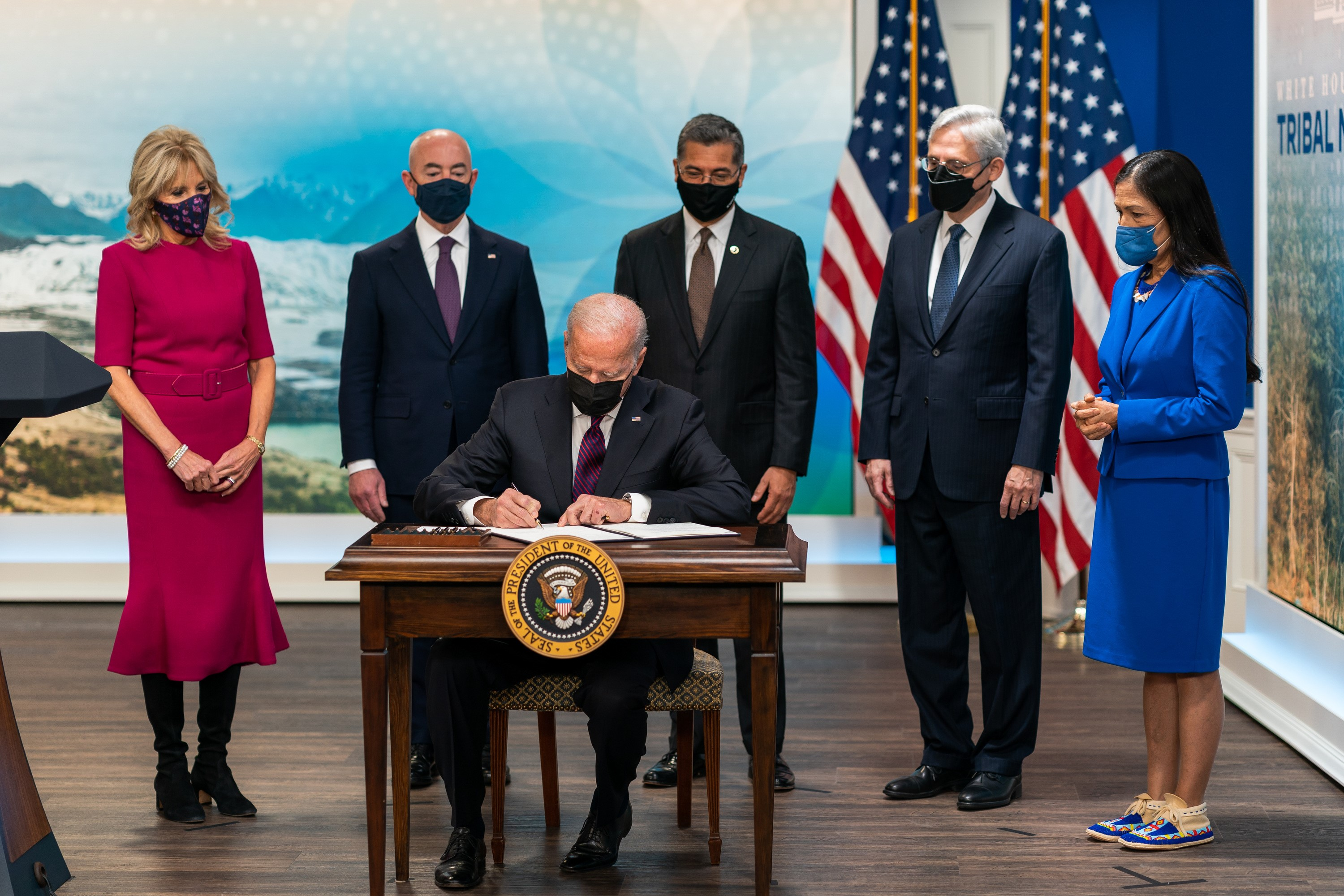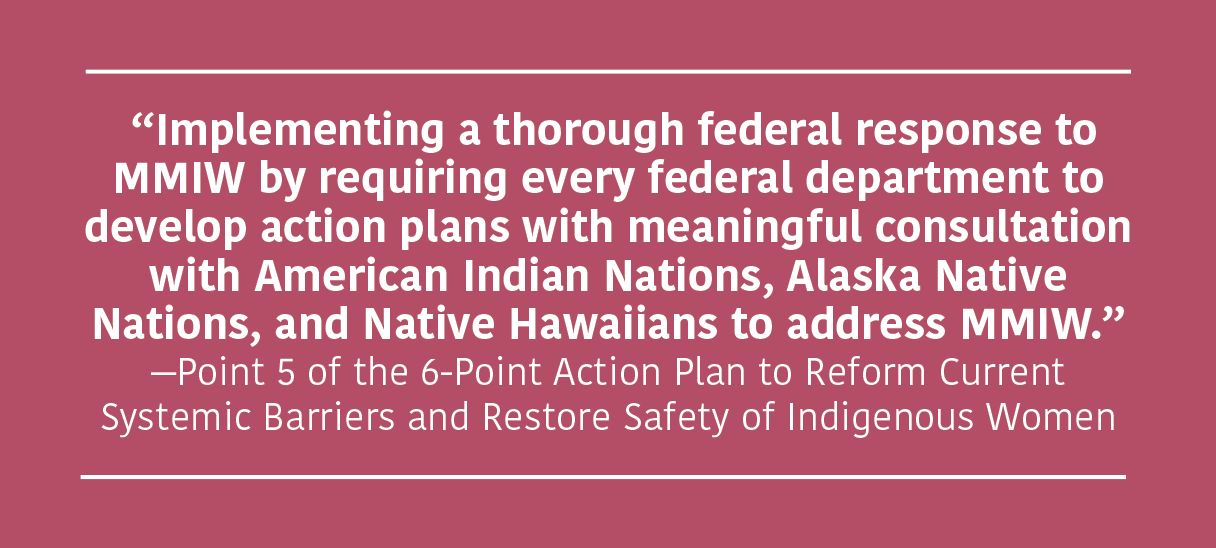President Biden Signs Executive Order

Federal Departments to Take Action to Address the Crisis of Missing and Murdered
On November 15, 2021, President Biden signed the “Executive Order on Improving Public Safety and Criminal Justice for Native Americans and Addressing the Crisis of Missing or Murdered Indigenous Peoples.”
The Executive Order (EO) directs numerous federal departments to take action based on the priorities identified. It is consistent with the strong grassroots calls for justice for missing and murdered Indigenous women (MMIW) and the reform of outdated federal Indian laws and policies that diminish sovereignty and self-determination of Indian Nations. The acts of violence against Indigenous women recognized as the crisis of MMIW while perpetrated by individuals, are the result of systemic barriers resulting in the spectrum of violence perpetrated against Indigenous women.
“President Biden’s leadership and directive to federal departments is essential and establishes the issue of MMIP, specifically MMIWG, as a priority for the Administration,” said Lucy Simpson, Diné, Executive Director, NIWRC. “It is consistent with the responsibilities of the federal government to support the sovereignty of Indian Tribes.”
The EO sets forth directives to the Departments of Justice, Interior, Homeland Security, and Health and Human Services to create a strategy to improve public safety and justice for Native Americans, and increase their response to the crisis of missing and murdered Indigenous Peoples and specifically Indigenous women.
“This builds on the work we did together on reauthorizing the Violence Against Women Act in 2013,” said President Biden.“We are going to reauthorize that again, we’re going to expand the jurisdiction to include other offenses, like sex trafficking, sexual assault, and child abuses.”
First Lady Jill Biden and four Cabinet Members—Interior Secretary Deb Haaland, Health and Human Services Secretary Xavier Becerra, Attorney General Merrick Garland, and Department of Homeland Security Alejandro Mayorkas—stood next to Biden as he signed the EO.

Recognition of May 5 as a National Day of Awareness Honoring MMIW
The U.S. Congressional effort by the delegation from Montana was launched in 2017 after the murder of Hanna Harris on the Northern Cheyenne Reservation and other abductions, missing cases, and murders of Native women. The 2017 Senate Resolution calling for a National Day of Awareness marked the first Congressional recognition of MMIW as a national issue.
Every year since 2017, a resolution recognizing May 5th as a National Day of Awareness for Missing and Murdered Native Women and Girls has passed in the Senate with increased support and awareness of the need to take action. These proclamations and social justice actions on May 5th have resulted in the increasing response from Congress, the White House, and federal departments, as well as from states and localities.
“NIWRC’s Restoration MMIW Special Edition is a 110-page publication aimed at supporting social justice actions by the national movement around missing and murdered Indigenous women this May and beyond,” said Mallory Adamski, Diné, Editor of Restoration Magazine. “This Special Edition shares the lessons and perspectives of families of MMIW and our six national partners. Based on the President’s Executive Order, we hope President Biden will provide leadership to every federal department to join our efforts to honor MMIW on May 5th, 2022.”
“As a mother, nothing will replace the loss of my daughter, but by organizing to support the National Day of Awareness and creating the changes needed, I know it will help others. And Hanna and so many others will not be forgotten.”—Malinda Limberhand, Mother of Hanna Harris, Honored by the National Day of Awareness 2017 Senate Proclamation
Meaningful actions must be rooted in the full recognition that MMIW is preventable and must start with removing systemic barriers to local, Tribal authority to immediately respond, and federal and state assistance.
Full Implementation of Savanna’s Act and Not Invisible Act
In 2020, Congress passed the Savanna’s Act and Not Invisible Act to address the Missing and Murdered Indigenous Women and Girls (MMIWG) crisis.
The passage of both Savanna’s Act and Not Invisible Act reflects the role that Tribal grassroots advocacy plays in effecting social change and critical legal reform. Unfortunately, the recent report from the Government Accountability Office noted both the Departments of Justice and Interior have failed to meet the statutory deadlines set under the new laws.
The Savanna’s Act is named in honor of Savanna LaFontaine-Greywind, a 22-year-old citizen of the Spirit Lake Nation in North Dakota who was pregnant at the time she was viciously murdered in August 2017. The Act aims to improve MMIW data collection and access and directs the Department of Justice to review, revise, and develop law enforcement and justice protocols to address missing and murdered Indigenous peoples.
The Not Invisible Act complements the Savanna’s Act with its purpose to identify and combat violent crime against Indians and within Indian lands through the creation of an advisory committee on reducing violent crime against Native people. Composed of Tribal leaders, law enforcement, federal partners, service providers, and survivors, the advisory committee will make recommendations to the U.S. Departments of Interior and Justice on increasing the response to violence against American Indians and Alaska Natives.
“The November 15, Executive Order is consistent with both Savanna’s Act and the Not Invisible Act,” said Rose Quilt, Yakama, Director of Policy and Research, NIWRC. “The crisis of MMIW requires immediate action and we hope the EO will set the tone of urgency that is needed to respond to the spectrum of violence against Indigenous women.”
Specific Requirements Responsive to MMIW
It is important to understand the connection between domestic, dating, sexual violence, stalking, trafficking and the high incidence of missing and murdered Indigenous women in the United States. It is the ongoing dehumanization of Indigenous women since contact that has eroded the original sacred status and protections that not only safeguarded our lives as women, but also our rights and well-being to live as Indigenous women within our respective Indian Nations.
In the efforts of the federal departments to respond, recognizing the need for specific Tribal based services for Indigenous women is essential. High on the list of services for Indigenous women are domestic violence shelters and safe housing and emergency shelter, rape crisis and ongoing services for sexual assault victims, and services for trafficking victims particularly teen girls.
The high rates of violence against Indigenous peoples can generally be attributed to the historical and ongoing colonization, the violence perpetrated specifically as a pattern against Indigenous women is undeniable. In the efforts of the federal departments to respond, recognizing the need for specific Tribal based services for Indigenous women is essential. High on the list of services for Indigenous women are domestic violence shelters and safe housing and emergency shelter, rape crisis and ongoing services for sexual assault victims, and services for trafficking victims particularly teen girls. Indigenous women need a range of culturally based services developed by and for Indigenous women.
“We applaud the President’s leadership to create foundational reforms to federal policies on violence against Indigenous Women and Peoples,” Simpson said. “True change is possible if the will exists to do what is necessary. The recent U.S. Civil Rights Report thoroughly documents the underlying systemic failures and roadblocks to restoring safety for Indigenous women. Through the passage of the Violence Against Women Act, the Family Violence Prevention and Services Act, and other federal legislation, the legal roadblocks can be removed and the protections and lifesaving services provided.”





